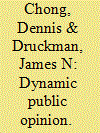| Srl | Item |
| 1 |
ID:
105194


|
|
|
|
|
| Publication |
2010.
|
| Summary/Abstract |
We develop an approach to studying public opinion that accounts for how people process competing messages received over the course of a political campaign or policy debate. Instead of focusing on the fixed impact of a message, we emphasize that a message can have variable effects depending on when it is received within a competitive context and how it is evaluated. We test hypotheses about the effect of information processing using data from two experiments that measure changes in public opinion in response to alternative sequences of information. As in past research, we find that competing messages received at the same time neutralize one another. However, when competing messages are separated by days or weeks, most individuals give disproportionate weight to the most recent communication because previous effects decay over time. There are exceptions, though, as people who engage in deliberate processing of information display attitude stability and give disproportionate weight to previous messages. These results show that people typically form significantly different opinions when they receive competing messages over time than when they receive the same messages simultaneously. We conclude by discussing the implications of our findings for understanding the power of communications in contemporary politics.
|
|
|
|
|
|
|
|
|
|
|
|
|
|
|
|
| 2 |
ID:
074850


|
|
|
|
|
| Publication |
2006.
|
| Summary/Abstract |
We propose and test a theory of opportunities that explains the conditions in which economic status affects support for racial and ethnic group interests among African Americans, Latinos, and Asian Americans. Using data from a 2001 Washington Post/Kaiser Family Foundation/Harvard University national survey, our analysis finds that, for all minority groups, the effect of economic status on support for group interests is mediated by the socioeconomic experiences of individuals. Intergroup differences therefore result from varying experiences and perceptions of discrimination among minority groups rather than from group-specific theoretical processes. Compared to Latinos and Asian Americans, African Americans are least responsive to changes in economic circumstances because they are on the whole more pessimistic about their life prospects and more likely to encounter discrimination. But we find in general that, among those minority individuals who perceive equal opportunity and experience less discrimination, higher economic status often leads to a reduced emphasis on race and ethnicity. These results demonstrate that the incorporation of a minority group into American society depends not only on the actions of group members but also on the fair treatment of that group by the majority population.
|
|
|
|
|
|
|
|
|
|
|
|
|
|
|
|